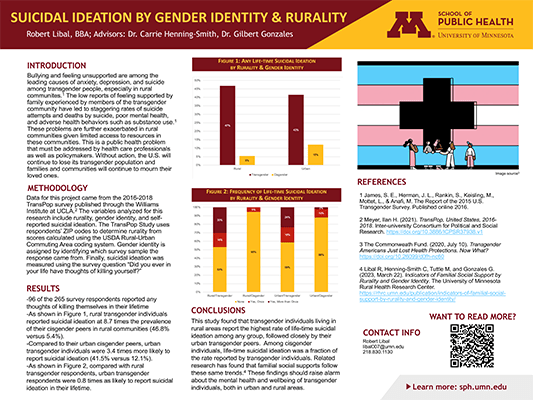Bob Libal
MPH, Public Health Administration & Policy
Advisor:
Carrie Henning-Smith
Keywords:
Transgender Health, Rural Health
Abstract
Background: LGBTQ+ health and wellbeing are an understudied area of research, especially for LGBTQ+ individuals living in rural communities in the United States. The relationship between gender identity, rurality, and emotional support has already been established and shows a severe decrease in emotional support when a non-cisgender individual lives in a rural area.2 It is important, however, to understand the differences in suicidal ideation by gender identity and rurality.
Methods: Data for this project will came from the 2016-2018 TransPop survey published through the Williams Institute at UCLA and accessed through the Data Sharing for Demographic Research (DSDR) Database.4 The variables analyzed for this study include rurality, gender identity, and self-reported suicidal ideation.
Results: Both rural and urban transgender individuals reported higher rates of suicide ideation than cisgender individuals, with approximately 96 of 265 respondents reporting any thoughts of killing themselves in their lifetime. Compared with rural transgender respondents, urban transgender respondents were 0.8 times as likely to report suicidal ideation. Rural transgender individuals reported suicidal ideation at 8.7 times the prevalence of their cisgender peers in rural communities. Compared to their urban cisgender peers, urban transgender individuals were 3.4 times more likely to report suicidal ideation.
Discussion: This study found that rural and urban transgender individuals report higher levels of lifetime suicidal ideation, and that both rural and urban cis gender individuals report lower levels of suicidal ideation than their transgender peers. These findings should be alarming about the wellbeing of transgender individuals in rural and urban areas alike.

View Poster (PDF)
